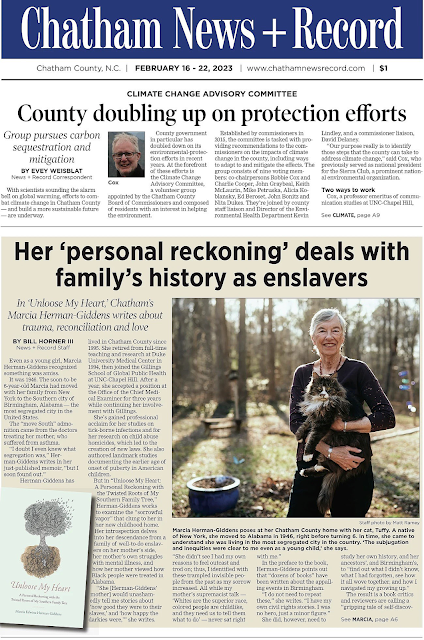So asks Buck Ryan, associate professor of journalism at the University of Kentucky, in his latest case study of the Chatham News + Record in Chatham County, North Carolina. He reports that Editor-Publisher Bill Horner III "has found a way to hurdle that challenge in award-winning fashion," getting more prizes "than any other newspaper its size from the North Carolina Press Association over the last three years."
The paper has a “6 Over 60” feature in partnership with Chatham County’s Council on Aging. The paper has sponsored events for COA, which has used grant funds to buy subscriptions for senior citizens who didn’t already subscribe.
 |
| Black History Month coverage included a story about a local woman who had written a book about her family's white-supremacist history. |
Chatham County, has a population of 75,070 people, with a Hispanic community (12%) about as large as its African American community (11%), Ryan notes. Horner has started, suspended, and revived a Spanish-language edition and talked with Ryan about appealing to Black and older residents. The county's average age is 47.
The paper has a “6 Over 60” feature in partnership with Chatham County’s Council on Aging. The paper has sponsored events for COA, which has used grant funds to buy subscriptions for senior citizens who didn’t already subscribe.
Ryan reports that the News + Record's front page "typically contains a photo or a story about someone in Chatham County’s African American community, and asked Horner to describe his approach to news coverage of that community. "We are intentional about it in part because when it comes to news—and recognition in the county—that’s an underserved population," Horner said, adding that it made aspecial effort to make this year's Black History Month coverage better than last year's, when "in all honesty, we didn’t do a great job last year of highlighting Black history and stories."
Horner said that as the paper has reported the removal of a Confederate monument and the placing of a historical marker remembering local lynching victims, "reaction has been mixed. No question we’ve lost some readers, but we’ve gained others. But it’s news, it’s part of what’s happening in a growing and changing market, and it’s incumbent upon us to take the lead to say what’s happening and why."
Ryan's interview with Horner also touched on the paper's newsletters on parenting and other topics, its staffing, a grant-funded revival of the Spanish-language edition, and a final section titled "Literacy, Good Writing and Required Reading." Some exceprts from that:
Ryan's interview with Horner also touched on the paper's newsletters on parenting and other topics, its staffing, a grant-funded revival of the Spanish-language edition, and a final section titled "Literacy, Good Writing and Required Reading." Some exceprts from that:
"My best writers are those who have been the most devoted readers of books and of great reporting. I hope I can say that I push them to be better writers and reporters. There’s only so much you can teach; there has to be a willingness and a desire to get better on their part, and also the capacity to understand and instinctively know what’s really good when it comes to reporting and writing. So we talk a lot about writing and share 360-degree feedback.
"We talk about what we’re reading. I give my kids books about writing and reporting and recommend books on those subjects to them. For example, Verlyn Klinkenborg’s Several Short Sentences About Writing is one I’ve given everyone. . . . I ask my reporters a lot of questions about word choice and sentence structure. We don’t do it as much in person; it’s mostly often done through editing on our server. As I said, I try to push. I don’t mind telling them a lede stinks; I have them read my stuff, and if my lede stinks, I want to know! . . .
"One thing I’ll never forget from my studies at the William Allen White j-school at the University of Kansas was one of my professors, Elmer Lower, telling us that the world will always, always need people who write well. If we, as journalists, could develop into strong writers, he said, there would always be a place for us." For Ryan's full report, click here.
"We talk about what we’re reading. I give my kids books about writing and reporting and recommend books on those subjects to them. For example, Verlyn Klinkenborg’s Several Short Sentences About Writing is one I’ve given everyone. . . . I ask my reporters a lot of questions about word choice and sentence structure. We don’t do it as much in person; it’s mostly often done through editing on our server. As I said, I try to push. I don’t mind telling them a lede stinks; I have them read my stuff, and if my lede stinks, I want to know! . . .
"One thing I’ll never forget from my studies at the William Allen White j-school at the University of Kansas was one of my professors, Elmer Lower, telling us that the world will always, always need people who write well. If we, as journalists, could develop into strong writers, he said, there would always be a place for us." For Ryan's full report, click here.
No comments:
Post a Comment